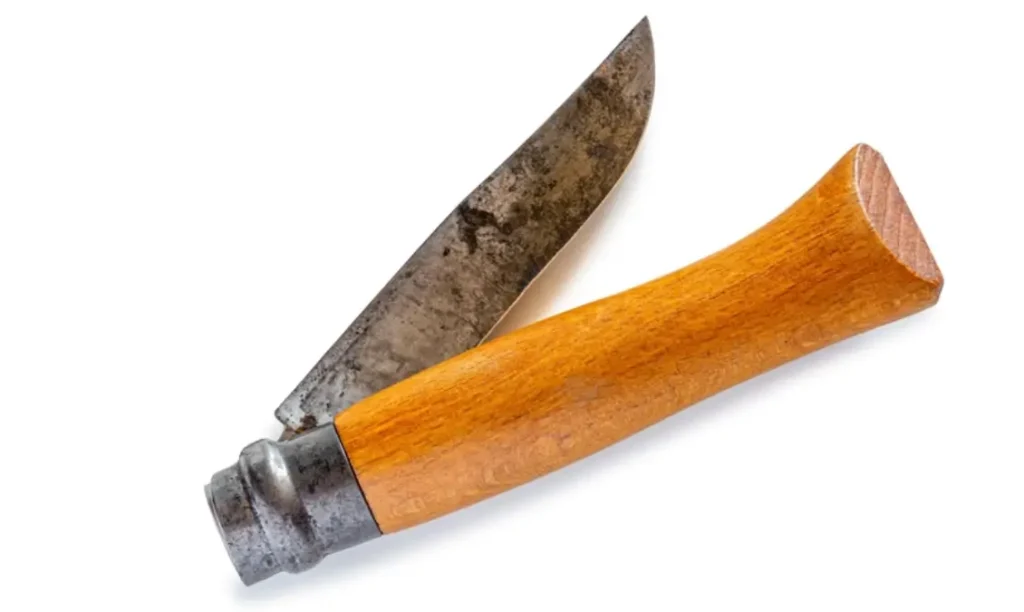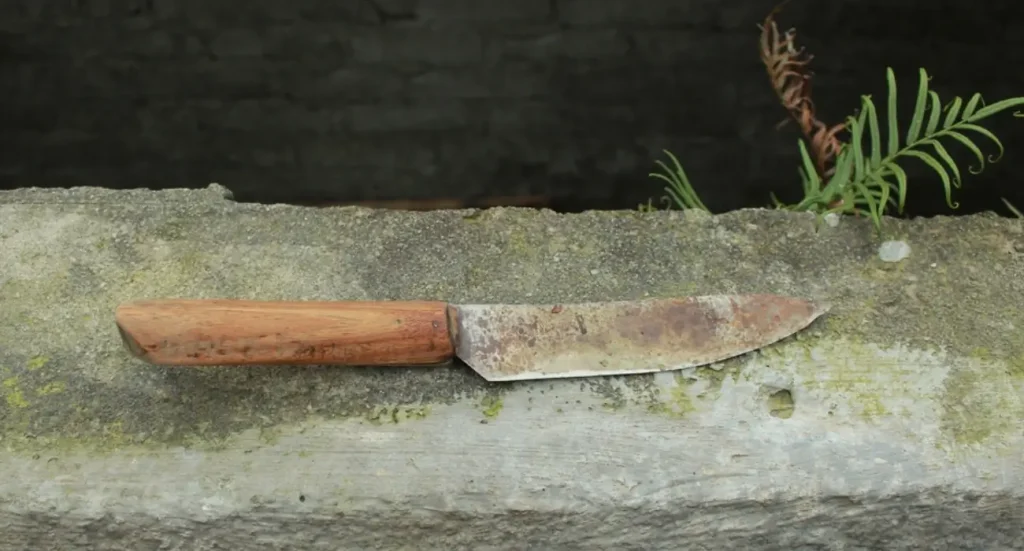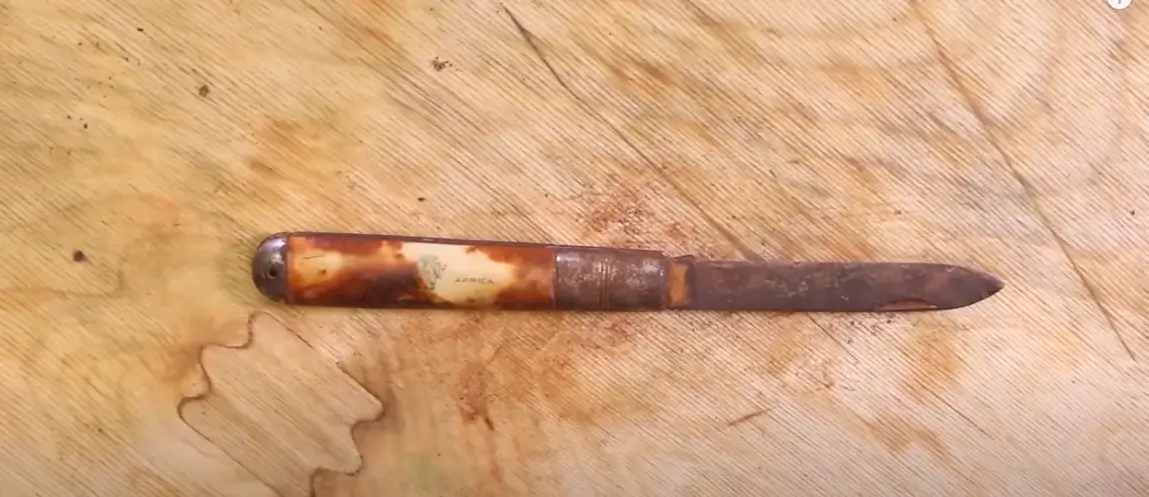Over time, knives will start to rust. It can be a hassle to keep them clean and dry all the time and you might not even realize they’re starting to rust until it’s too late!
Rust is a type of corrosion that occurs in metals, and it’s a common problem when it comes to knives. The most well-known culprits for this rusting are moisture and oxidation, which can come from many sources: your hands, the water you use to clean your knife, and even the air itself.
To save you from this problem, here are the best tactics for how to keep a pocket knife from rusting and 9 ways to clean rust from your pocket knife.
How to Keep a Pocket Knife From Rusting?

If you’re like most people, you probably don’t think twice about throwing your pocket knife in your drawer or toolbox after using it. However, if you want to keep your knife in good condition, it’s important to take a few precautions to prevent it from rusting. Here are some of the things you should avoid doing if you want to prevent your pocket knife from rusting:
Store Your Knives in A Dry Environment
Storing your pocket knife in a damp or humid environment is a surefire way to get it to rust. Rust forms when the iron is exposed to oxygen and moisture, so by keeping your knife in an environment where both of those things are present, you’re essentially asking for rust to form. That’s why you must store it in a dry environment.
Avoid Exposure to Corrosive Materials
If you’re like most people, you probably don’t think twice about using your pocket knife near salt water. After all, it’s just a little bit of water, right? Wrong. Saltwater is one of the most corrosive materials out there, and it can wreak havoc on your pocket knife if you’re not careful. Here are some tips to help you avoid exposing your knife to salt water:
- Keep your knife in a sheath or case when you’re not using it. This will help protect it from the elements, including salt water.
- Avoid using your knife in salt water if at all possible. If you absolutely must use it near salt water, be sure to clean and dry it as soon as possible afterward.
- If your knife does come into contact with salt water or other corrosive materials, it’s important to clean and dry it as soon as possible.
Store Your Knife in A Protective Case
One of the best ways to keep your pocket knife from rusting is to store it in a protective case when not in use. This will help to keep moisture and other elements from coming into contact with the blade and causing it to rust. You can find a variety of different types of cases that will fit your specific knife at most stores that sell knives.
Dry Thoroughly Your Knife After Washing
It is important to dry your knife thoroughly after washing it, as even a small amount of water left on the blade can cause rusting. The best way to do this is to use a soft cloth or paper towel to wipe off any water, making sure to get into all the nooks and crannies. Once the knife is dry, you can store it in a dry place until you’re ready to use it again.
Clean Your Pocket Knife Often
If you don’t take care of your pocket knife, it will eventually rust. Rust not only looks bad, but it can also damage the blade and make it difficult to use.
To clean your pocket knife, start by disassembling it. This will allow you to get at all the nooks and crannies where rust likes to hide. Once disassembled, use a soft cloth or brush to remove any dirt, debris, or grease from the blade and handle.
Next, rinse the knife in warm water. Be sure to get rid of any soap residue by rinsing several times. Finally, dry the knife completely with a clean towel before reassembling it.
If your pocket knife is particularly dirty or rusty, you may need to use a stronger cleaning solution such as vinegar or bleach. However, be sure to rinse well and dry completely after using any of these solutions.
Why It Is Important to Prevent Rust From Your Knives?

If you’ve ever had a pocket knife that became rusty, you know how frustrating it can be. Not only does it look bad, but it can also make the knife difficult to use thus affecting its performance. Rust makes your blade dull and can even cause it to break. That’s why it’s important to prevent rust from your knives for the best use.
How to Remove Rust from Pocket Knives? Natural Methods?
Method 1: Baking Soda
If you don’t have any WD-40 or vinegar on hand, baking soda can also be used to clean and protect your pocket knife from rust. Simply mix baking soda with water to form a paste, then apply the paste to your knife with a soft cloth. Rub the paste into the blade and handle, then rinse well with warm water. If your knife is very rusty, you may need to repeat this process several times.
Method 2: Using Vinegar
Vinegar is a household staple that can be used for cleaning, cooking, and even rust prevention. When it comes to pocket knives, vinegar can be used to help remove rust and prevent future rusting. To use vinegar for rust removal, simply soak the knife in a bowl of vinegar for a few hours or overnight.
You may need to scrub the knife with a soft brush to remove all the rust. Once the knife is free of rust, rinse it off with water and dry it thoroughly. To prevent rust in the future, you can wipe your pocket knife down with a vinegar-soaked cloth after each use.
Method 3: Using Salt and Lemon
If you’re looking for a quick and easy way to prevent your pocket knife from rusting, try using salt and lemon. All you need is a lemon, some salt, and a clean cloth. First, cut the lemon in half and sprinkle the salt onto the cut surface. Next, rub the lemon halves over the blade of your pocket knife, making sure to cover all of the metal. Finally, wipe off any excess salt and lemon with a clean cloth.
This method is great because it’s so simple and it only requires items that you likely already have in your kitchen. Plus, it’s a natural way to clean and protect your knife. Just be sure to rinse off any residual salt before putting your knife away.
Method 4: Using Raw Potato
If you have a pocket knife that is starting to rust, you can use a raw potato to help remove the rust. First, cut the potato in half and then rub the cut side of the potato over the rusty area of the knife. The acid in the potato will help to break down the rust. You may need to do this a few times to remove all of the rust. Once the rust is gone, you can rinse the knife off with water and dry it with a clean cloth.
How to Clean Rust from Pocket Knives? Some Other Methods
If the above methods don’t work, you can try these methods as well but the above methods are more recommended due to being natural materials.
Method 5: Cleaning and Oiling
If you use your pocket knife often, it’s important to clean and oil it regularly to prevent rust. Here’s how:-Start by disassembling the knife and cleaning all the parts with a soft cloth. Be sure to clean both the inside and outside of the blade as well as the handle.
Once all the parts are clean, apply a light layer of oil to them. You can use any type of oil, but mineral oil is a good option.-Reassemble the knife and stores it in a cool, dry place. If you live in a humid climate, consider storing your knife in a sealed container with a desiccant packet to absorb moisture.
Method 6: Soaking in Oil
If your pocket knife is starting to show signs of rust, you can try soaking it in oil. This will help to lubricate the blade and prevent further rusting.
You will need:
-A clean cloth
-A small bowl or cup
-Oil (any kind will do)
Instructions:
- Wipe down your knife with a clean cloth to remove any dirt or debris.
- Place the knife in the bowl or cup and add enough oil to cover the blade.
- Let the knife soak for at least 30 minutes, then remove and wipe off any excess oil.
- Repeat this process as needed to keep your knife in good condition.
To Read more about Rust:

